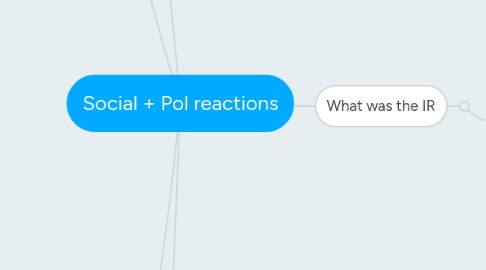
1. Introduction
1.1. The industrial revolution made many changes in the world.
1.1.1. Before the IR, many people were still living, and working at home with their family in cottage industries, but with the new machines, cottage industries were no longer needed.
2. Laws
2.1. In 1250 the Magna Carta was passed. This was the first major step that was taken in favour of human rights.
2.2. Combination Act 1799
2.2.1. It made unions, and strikes illegal
2.3. Chartist act 1830
2.3.1. Every man should vote
2.3.2. annual elections
2.3.3. end of property qualifications needed for mp everyone could be mp
2.3.3.1. Throughout the years to come everything was achieved, but many rules got rejected at the start.
2.3.4. mp had salary
2.4. 1833- Slave trade ended factory act -9 couldn't work, and 9-13 had limited hours
2.5. Mine acts 1842 mining became a protected job, and women, and children below 15 couldnt work underground
2.6. Reform act 1867
3. Political reform
3.1. Magna carta was a treety signed by Englands King John
3.1.1. It was created because of unsuccessful foreign and tax policies
3.1.2. It put the king and the wealthier class under rule of law
3.2. It was created because of unsuccessful foreign and tax policies
3.3. It put the king and the wealthier class under rule of law
3.4. It is very important documents in history because it guareented people certain rights and put the wealthier people under law
3.5. Peter loo Massacre took place in 1819 and was led by Henry Hunt who called for a reform for the unrepresented working class
3.6. So a crowd of peaceful protesters arrived at what is now st peters square
3.7. But the magistrates who saw them described crowd as if it was a mob
3.8. As a result a warrant was put on Hunt and soldiers were sent into the crowd as a result 15 were dead and 140 injured
3.9. The chartists t was a working class movement calling for political reform and took place from 1838 to 1858
3.10. It demanded six reforms
3.11. 1.annual elections for house of commons
3.12. 2. right to vote for males
3.13. 3. An end to the Rotten Boroughs
3.14. 4.Allowing working class to be elected into house of commons
3.15. 5. Salaries for the house of commons
3.16. the chartists movement was rejected several times from 1839 to 1842
3.17. in 1839 it collected 1 mill signatures and in 1842 it rose up to 3 million
3.18. Laisszes faire economists argued that if workers had higher wages they would have more children which would lead to higher unemployment and lower wages
4. Change in Ideology
4.1. Marxism
4.1.1. Marxism was a theory proposed by Karl Marx in 1884
4.1.1.1. He proposed that it is nature (also taken from the french revolution) that if the situation doesn't change the poor will revolt
4.1.1.1.1. This is because they have no choice as they are treated so badly.
4.1.1.1.2. because they will have nothing to loose, their revolt will be very dedly
4.1.2. In marxism, everything is owned by the government, and it's a classless society
4.1.2.1. everything was shared,
4.1.2.2. therefore there was no rich or poor
4.1.3. Karl Marx
4.1.3.1. He was a Jew, but hated religion
4.1.3.2. His uncle had one of the biggest capitalist companies in the world
4.1.3.2.1. but he strongly disagreed to capitalism
4.1.3.3. he refused to pay salary for his workers
4.1.3.3.1. Condition, and society, and means of production are controlled by the government.
4.1.3.4. he was a disturbed man
4.2. Socialism
4.2.1. It is when the government owns everything, and is in charge of giving things out fairly to people.
4.2.1.1. There is no private property
4.2.1.1.1. meaning if you had a house passed down generations, then it wouldn't be yours anymore it would be the state's.
4.2.2. Socialism is the second stage of the marxism theory, before communism.
4.3. Communism
4.3.1. There is no private property
4.3.2. Single authoritarian party that controls production
4.3.3. Communism is the final stage of the marxism theory, after socialism
4.4. everything is given to people according to their needs.
5. What was the IR
5.1. Capitalism
5.1.1. When a country's industry is controlled by private owners for wealth, and profit rather than by the state.
5.1.2. In the industrial revolution capitalism was the leading ideology.
5.1.2.1. because of this, the rich, and high middle class owned factories plainly for wealth, and money and didn't care for the workers in them
5.1.2.1.1. This led to people working in factories long hard hours, with not much pay at all.
